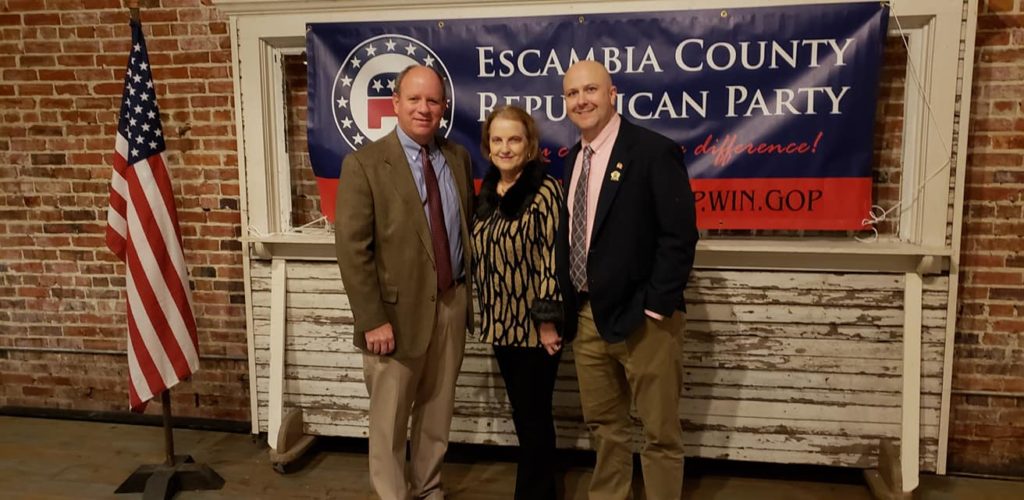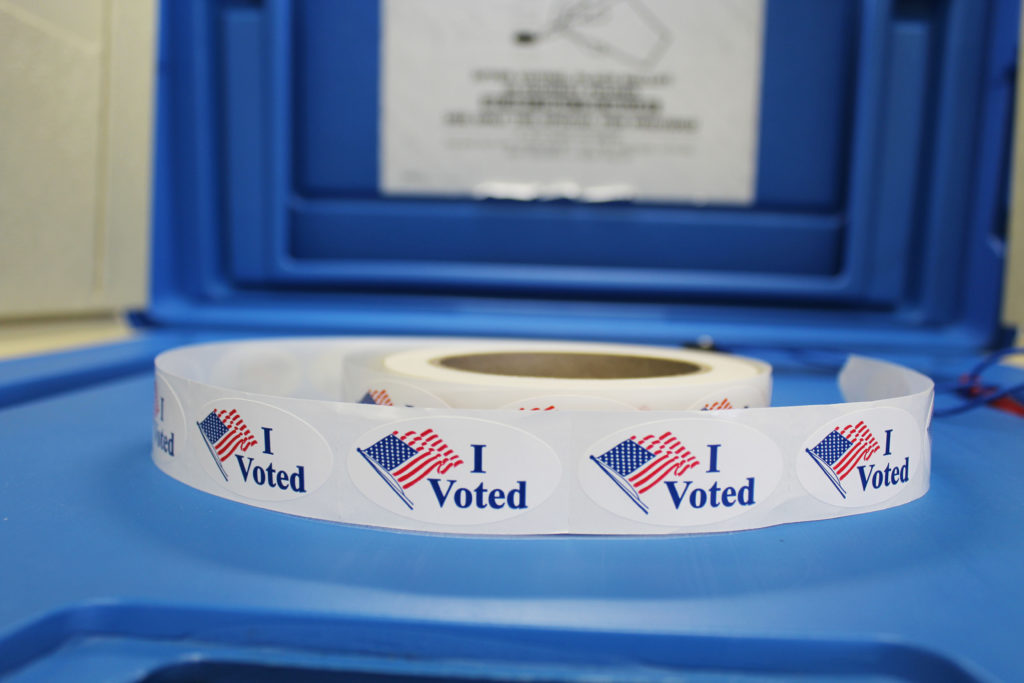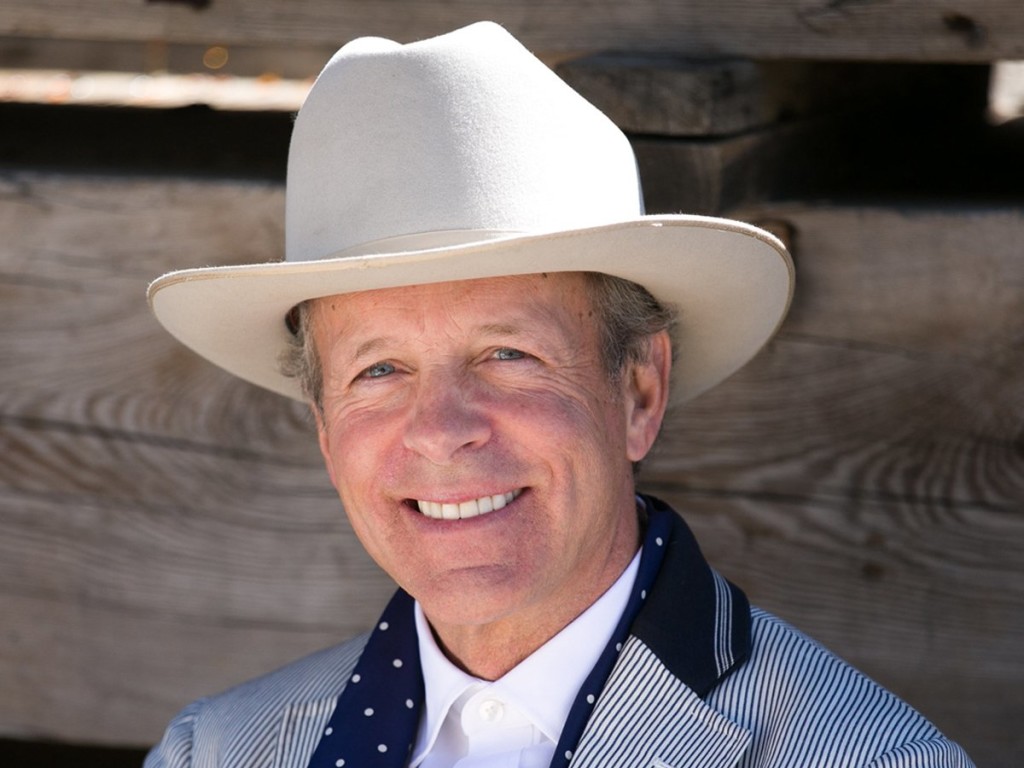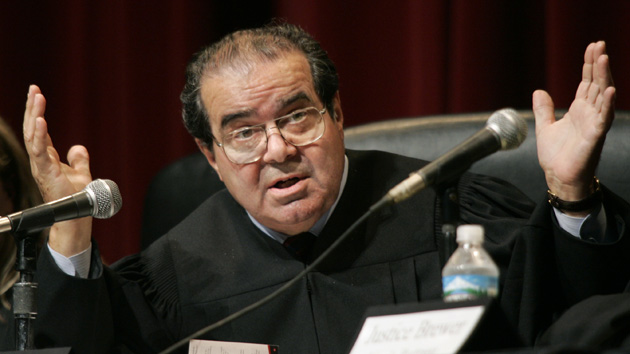ALGOP welcomes two former Democrat elected officials with open arms

The Escambia County Republican Executive Committee recently welcomed two former Democrat elected officials to the ALGOP: Circuit Clerk John Robert Fountain and Tax Assessor Thad Moore, Jr. Jackie Gay, Escambia County GOP Chairman, made the following statement regarding the new Party members: “We look forward to working with Mr. Fountain and Mr. Moore as we continue to advance conservative policies and principles. Both men display professionalism in their offices and are active in community service. We are happy to have both of these conservatives join our Party.” Alabama Republican Party Chairman Terry Lathan took to social media to welcome to former Democrats with open arms to the state party. “Two more county Dems switch to the GOP in Alabama in Escambia County! More walking away from the party of resistance, obstruction and left wing policies #alpolitics #WalkAway,” Lathan tweeted. Two more county Dems switch to the GOP in Alabama in Escambia County! 🐘👏🏽 More walking away from the party of resistance, obstruction and left wing policies #alpolitics #WalkAway pic.twitter.com/XejDwRZ3Mo — Terry Lathan (@ChairmanLathan) January 29, 2019 Later, in a statement, she added to her thoughts. “We are delighted to welcome Mr. Fountain and Mr. Moore to the Alabama Republican Party team. It is clear the policies of our Party are working to better the lives of Alabamians and those on the opposite side of the aisle are taking notice,” said Lathan. “Mr. Fountain and Mr. Moore are among the large numbers of Democrats who have walked away from the liberal policies of the Democrat Party. We welcome all who share our Party’s principles and values. We are proud that 67% of all partisan elected officials in Alabama are Republicans.”
Americans offer hope, prayer in assessing Donald Trump’s 100 days

They are young and old: a high school student who can’t yet vote, a Vietnam vet who did so proudly. They hail from all corners of the United States and very different walks of life: a “downhome boy” from Kentucky, a third-generation Mexican-American from Texas, a stay-at-home mom in Pennsylvania, an Iranian immigrant in Los Angeles. Some oppose Donald Trump and all that he stands for, while others voted enthusiastically for him. Now, they are critiquing him. One hundred days into Trump’s presidency, The Associated Press returned to some of the everyday people interviewed these past months to ask them to write a letter to the president, evaluating the job he’s done so far and looking ahead to the months to come. One supporter tells the president he “might have fallen a little short” — on Obamacare, in particular — but he signs off “with hope.” A refugee implores Trump to “make America more friendly,” but finds optimism in the president’s reaction to this month’s chemical attack in Syria: “I hope this is a turning point.” A Trump objector calls his biggest accomplishment “waking up the public to fight.” She offers this advice: “Make decisions with your heart. It will give you wisdom.” ___ FROM RURAL AMERICA, A SUPPORTER SEES HOPE IN TRUMP’S PRESIDENCY Alan Halsey, 31, is a self-described “downhome boy” from Campton, Kentucky, who along with his wife owns and operates The Swift Creek Courier, a weekly newspaper, and Halsey’s Country Store, “a small business that is a chunk of 1950 set down in 2017.” He says he works seven days a week to try to provide for his family, but is struggling and tired of government regulation and red tape. He wrote: ” … I supported you quite strongly in the 2016 election, even to the point of hanging one of your signs on the front door of my business. I particularly related to your foreign policy of ‘America First,’ and your promise to bring business back to the United States. So far, I believe you’re heading in the right direction on that front, and I find a glimmer of hope in the future of the American economy. “Overall, I think you might have fallen a little short on your first 100 days, but I don’t put a lot of weight into a time frame that small. Provided you serve two terms, 100 days is about 4 percent of that. I still feel that something needs to be done with the Affordable Care Act, although I’m not certain exactly what. … I know many ACA recipients that visit a doctor more than once a week, while those that purchase their own insurance wait until a visit to a doctor is imperative to their survival. There must be a middle to that scenario. …” He signed his letter: “With Hope.” ___ CANCER SURVIVOR WORRIES OVER TRUMP’S PROPOSED BUDGET CUTS, BUT PRAYS FOR HIM Rebecca Esparza, 45, is a freelance writer in Corpus Christi, Texas, who didn’t vote for Trump. A cancer survivor, Esparza fears proposed budget cuts targeting the nation’s premier medical research institution, the National Institutes of Health, will hurt Americans who battle illness. She wrote: “. I cannot say I’m proud of your work so far. However, I have respect for the Office of the President, even if I disagree with your political aspirations. … I could write a dissertation on the many ways I disagree with your political ideals. I’m a third-generation Mexican-American, born and raised in South Texas. Your disdain for Mexico, its descendants and immigrants in general troubles me. Your plan to dismantle the Affordable Care Act, leaving millions of Americans with no other health insurance options, leaves me anguished. “But what distresses me most is your plan to cut nearly $6 billion in funding from the National Institutes of Health (NIH). On Thanksgiving Day in 2001, at age 30, I was diagnosed with ovarian cancer. … Cancer research saved my life. … The cuts you are proposing are disconcerting not only for cancer survivors, but for millions of Americans suffering from many types of chronic and rare diseases. … “I’ll be praying for you, President Trump. … I pray you will carefully consider how your decisions have life or death consequences for hard-working Americans.” Read more about Esparza. ___ ONE-TIME OBAMA VOTER FEELS PRIDE IN TRUMP’S WORK Laverne Jones Gore, 60, owns an executive leadership development company in Cleveland and voted for Trump after previously supporting Barack Obama. Gore calls herself a “middle-class American who happens to be black” and says she felt uncomfortable voicing her opinion during the Obama years, but Trump has “made me proud to be an American again.” Part of a military family — her deceased husband was a Marine and a son graduated from West Point — Gore’s one hesitation these past 100 days is over Trump’s airstrike in Syria. She wrote: ” … Mr. President you have absolutely met my expectations. I actually believe you have shown a strength that I had not given to you, and I am surprised by your willingness to meet head on the challenges and resistance within your governing bodies. I don’t believe you have been afforded an opportunity to really show us what you have to offer in the form of leadership of our nation. “I have no issue with you as it relates to ‘Russians.’ I personally believe most of it was contrived. I have no issue with you as it relates to immigration. I think the issues were in need of control. … I have some reservations about your use of Twitter, but I understand the difficulty you have getting your intended message out. “Yes, you surprised me with the Syria strike and I am not certain how I feel about another war or thought of war. I am still contemplating your action and observing the responses to come from the world theatre as they absorb your full intent.” ___ ‘YOUR SIGNATURE CRUSHED MY FAMILY’ Marjan Vayghan, 32, an artist and writer
Selma mayoral race heads to a runoff

Selma voters winnowed the crowded field of five mayoral candidates down to two at the ballot box Tuesday. State Rep. the Rev. Darrio Melton and former Selma mayor Rev. James Perkins, Jr. will face off Oct. 4 in a runoff election. While the official results are not in, the unofficial results have Melton with 35 percent of the vote and Perkins with 30 percent. Incumbent Mayor George Evans, who is nearing the end of his second term, will definitively finish in third place with 18 percent of the vote, writing the end of his mayoral career. Eight years ago, Evans defeated Perkins for the position.
Mark McKinnon says The Circus will evolve when presidential race becomes two-person contest

Mark McKinnon is a man of many hats. Cowboy hats, that is, which is his signature look. He’s done a lot of things in his life, but he’ll probably always be best known for his association as an ad man for George W. Bush‘s presidential campaigns. He’s also the co-creator, co-executive producer and co-host of “The Circus,” a weekly Showtime documentary series on the presidential campaign. The show is a co-production between Showtime and Bloomberg Politics. FloridaPolitics.com spoke with McKinnon last week from Columbus, Ohio, on Super Tuesday III. We mentioned to him how we’ve seen him twice on the campaign trail this year – A week earlier at the Tampa Convention Center for a Marco Rubio rally, and in Derry, New Hampshire when Barbara Bush came out in a much-publicized announcement for a campaign appearance with son Jeb. Florida Politics: You’ve been constantly covering the campaign for The Circus since mid-January. Do you ever get home these days? Mark McKinnon: I get home about one day every couple of weeks. This has been such a circus, and a fascinating one. We got really lucky picking this election to do this, but there’s been no absence of drama. So yeah, I’ve been kicking around in New Hampshire like you were, in Florida where you are, in Columbus today. Sometimes I don’t know until 11 p.m. at night where I’m going to be, which was the case before last, where I thought I was going to Florida, then I got a call that Romney was going to be with (John) Kasich, so I just flipped my plans at midnight and went to Ohio. FP: How big of a crew do you have to capture so much footage for your show each week, and get it edited each Sunday night? MMK: Well, it’s a massive challenge. When I pitched this to television networks – I could write a whole book about how that works – I had the idea 10 years ago. That’s how long it took to get on. The real challenge, and what scared most television executives, was this notion of doing it weekly. Because they’re used to seeing shows months ahead of time. In this case, Showtime only sees it hours before it airs, and at that point, they can’t change much. But to me, the whole idea behind the concept was to produce a great documentary that shows this fascinating world of a presidential campaign. The public sees maybe 1 percent of what really goes on the news. So there’s all this other stuff that happens which is really interesting and entertaining and informative, so I thought it’d be fascinating and dramatic for viewers to see this and see sort of human side of politics and what these people go through. Also importantly, I thought it needed to be in real time as much as possible. So that people were not only seeing an interesting world, but seeing it as it was unfolding, so that it was topical and they feel like they were kind of up on what’s happening. I thought the political junkies would love it — which they do — but people who are casually interested in politics would love it as well because of the way in which every Sunday night they can tune in and in a way that’s much more interesting than a Sunday talk show or reading the newspaper, they can get up to speed on what’s happening. We have 60 people working on this and four crews spanning out across the country, and we have to make a full-blown documentary every week and then wake up every Monday morning, and make another one. So, the production challenge, I mean, it’s a crushing schedule. The logistics of managing of the schedules and moving these crews around is incredible, but Showtime gave us the best in the business, and we’re really excited to be doing it. FP: One of the most interesting scenes to date in the show is one I viewed online dealing with the Trump phenomenon and the general freaking out by the Republican Party establishment. You showed this private lunch in D.C. with of GOP establishment figures, lamenting the rise of Trump and discussing, what if anything can be done about it (Those six men were Ron Hohlt, Vin Weber, Ron Kaufman, Ed Rogers, Ed Goeas and Mike Duncan). MMK: That scene has been one of the most provocative of the season, and it’s gotten a huge response. The idea was that we would find what’s left of the establishment and take them to lunch, and it turns out that there’s six guys left who are the establishment, and we found them, and they’re right out of central casting: They couldn’t be less diverse (laughs). It’s just a bunch of old white guys who have been around Washington forever, and they’re super smart, and they’ve been in every presidential campaign as far back as you can remember, and they’re movers and shakers, and they’re the go-to guys. If you randomly picked 100 people and said who were the six most influential guys, they’d picked these six guys. But the fascinating thing was they agreed to join us at a classic Washington restaurant with black leather and chrome and martinis, but they just opened up and they were completely candid, which you feel sort like you dropped in on a Mafia Boss meeting. But what was surprising about it was A) how candid they are in the situation they find themselves in, but B) that they were very clear that they don’t have a clue about what to do. They have no clear idea or consensus how to approach it. In fact, all six at the table basically had six different ideas on what to do. FP: Your show began in January, when there was so much interest heading into Iowa. We’ll see how soon this race turns into a one-on-one race between the Democratic and Republican nominee. Right now there’s still so much to cover, but do you have any concerns when it slows down to two people and one race. Will the show be able to
Darryl Paulson: The Antonin Scalia battle: The stakes have seldom been as high

The passing of Supreme Court Justice Antonin Scalia on Feb. 3, has created an opportunity for both the executive and legislative branches to work together. If they can’t, American politics will face a crisis of enormous magnitude. That is how serious the situation has become. Whether liberal or conservative, most agree that Scalia was a judge who profoundly influenced the court during his three decades there. Many rank him among the giants such as John Marshall, Oliver Wendell Holmes, Jr., and William Brennan. Besides his opinions on court decisions, Scalia’s primary contribution was pushing the doctrines of “originalism” and “textualism.” Scalia’s doctrine of originalism argued against the grain of existing legal thought that the Constitution was a living document constantly in change. Scalia believed that the Constitution should be interpreted as the 18th-century framers understood it. In other words, there is no protection for abortion and gay rights, and no sanction for affirmative action. “Textualism” was a more widely accepted doctrine. According to Scalia, textualism meant that when interpreting laws, the courts must not look at the legislative history or Congressional intent, but the courts must only look at the words of the law. Among the current court, only Justice Stephen Breyer rejects textualism. There is little doubt about Scalia’s intellectual ability. He was valedictorian at Xavier High School, finished first in his class at Georgetown and was magna cum laude at Harvard Law School. After spending six years in private practice, he taught four years at the University of Virginia Law School. He then served as legal counsel for a federal agency before having a distinguished career at the University of Chicago Law School. Scalia had disappointments. When Ronald Reagan was elected president in 1980, Scalia wanted to be appointed Solicitor General. Instead, he lost out to Rex Lee and told his biographer that “I never forgot it.” Scalia was appointed to the District of Columbia Circuit Court in 1982. That circuit serves as a feeder to the Supreme Court, and that happened in 1986 when Reagan nominated Scalia to a position on the highest court. Scalia was confirmed 98-0 and would be the last ideological judge to be confirmed without opposition. The next year, the Senate rejected Robert Bork, and “borking” became the process of defeating ideologues. Within hours of the announcement of Scalia’s death, leaders in both parties were trying to define the nomination process. Senate Majority Leader Mitch McConnell announced that the Senate should wait until after the 2016 presidential election to confirm a replacement. “The American people have a voice in the selection of the next Supreme Court Justice,” said McConnell. “Therefore, this vacancy should not be filled until we have a new president.” Within minutes, Senate Democratic leader Harry Reid responded that the American people did have a voice. They elected Barack Obama as president in 2012. Reid argued that the nation cannot afford to go a full year with a split Supreme Court. “Failure to fill this would be a shameful abdication of one of the Senate’s most essential Constitutional responsibilities,” Reid said. To be confirmed, any Obama nominee would need a minimum of 50 senate votes in a body where Republicans now hold 54 of the 100 seats. The threat of a Republican filibuster would mean that the Democrats would need all 46 Democrats to support the nominee along with 14 of the 56 Republicans. That is very unlikely in the era of “borking.” The Supreme Court is facing many controversial issues this term including abortion, contraception, unions, voting rights and affirmative action. All may be affected by Scalia’s death and the possibility of a 4-4 deadlock on the court. For example, in the Fredricks v. California Teachers Association case, it appeared during oral arguments that it looked like a five-member majority would reverse a lower court decision requiring teachers who did not join the union to pay for the benefits of any collective bargaining agreement. Without Scalia, a 4-4 decision would mean the lower court decision would prevail. There are many political calculations at play. Will Obama nominate a moderate candidate to win Republican support? If so, will progressive Democrats balk? Will Obama nominate another liberal like Sonia Sotomayor or Elena Kagan? If so, will Republicans even hold hearings? Will moderate Republicans running for re-election in swing states pressure party leaders to hold hearings so that the party will not appear obstructionist? Will McConnell accept a moderate and risk jeopardizing his leadership position? Will Democrats accept a moderate and risk appearing to cave in to the Republican majority? When both sides shooting political bullets, will one of the parties be willing to holster the gun? Will that party look like the good guys acting responsibly, or will they look like political wimps unwilling to fight the good fight? The stakes are high; the outcome is indeterminate. *** Darryl Paulson is Professor Emeritus of Government at the University of South Florida St. Petersburg and resides in Palm Harbor, Florida.
Public Service Commission approves new small business incentives

At the October meeting of the Alabama Public Service Commission, the 3-member regulatory panel gave the green light to a pair of new incentives for small businesses meant to encourage commercial expansion into underserved areas. One incentive called the Community Redevelopment Incentive or “CRI,” gives businesses a discount on their energy bill for up to one year in exchange for an agreement to activate an Alabama Power electricity account in a building that has gone unoccupied for at least six months. The other initiative, called the Economic Development Incentive or “EDI,” provides two year’s worth of incentives for customers “meeting criteria related to additional incremental load,” meaning substantially increasing their levels of consumption, presumably by way of renovation or expansion. “Because these incentives will increase the number of Alabama Power customers,” said the office of the PSC in a news release Tuesday afternoon, “they will also put downward pressure on the rates of all customers.” PSC President Twinkle Andress Cavanaugh, a former Republican party leader who served as the state GOP’s first female Chairman, said the twin moves by the regulatory body are in keeping with its conservative direction. “Alabamians can rest assured that I will continue to do what I have done throughout my tenure at the Public Service Commission – fight for you and against the federal government’s relentless assault on our economy,” said Cavanaugh. “President Reagan was right when he said, ‘Government is not the solution to our problem; government is the problem.’” The PSC’s other two commissioners echoed her remarks, though less pointedly, in accompanying statements Tuesday afternoon following the commission’s unanimous vote. “Small Business is a cornerstone to the American dream,” said Commissioner Jeremy Oden, who was appointed to the PSC by Gov. Robert Bentley. “One of my top priorities has always been to protect and promote small business and help provide every man or woman with the opportunity to achieve that dream. I was proud to vote today for incentives that will assist small business in today’s political climate.” Commissioner Chris “Chip” Beeker, Jr. concurred with his fellow regulators. “The two incentives we approved today will benefit small business owners who take the risks necessary for job creation and retention,” said Beeker. “I am hopeful that our actions will work to counter the federal regulations that increasingly punish those individuals who serve as the backbone of our economy.” All three commissioners are statewide elected officials who were elected on the Republican ticket. The announcement proclaiming the new incentive deals came with introductory barbs pointed at contemporary energy policies prevailing among federal officials and regulators. “Sadly, the greatest challenges facing small businesses are the overly-burdensome governmental red tape and mandates coming from Washington, DC,” read the announcement. “The PSC Commissioners recognize that, in today’s economy, government should not hamstring business owners but, rather, should remove the obstacles they face and make their job of creating jobs easier. Unlike the federal government, the Commissioners intend to help the economy, not hurt it.”


